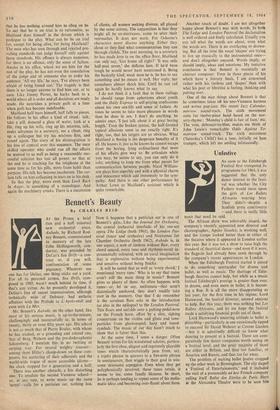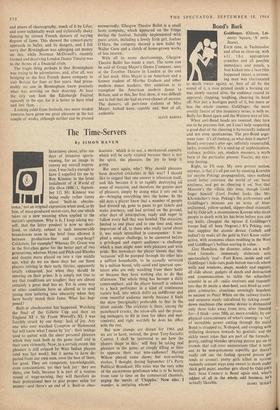Unfestive
As soon as the Edinburgh Festival first trumpeted its programme for 1964, it was suggested that the only dance interest in the festi- val was whether The City Fathers would insist upon the girls of Les Ballets Africains wearing bras. They didn't—despite a Scottish press controversy —and there is really little more that need be said.
The African show was admirably staged, the company's recently appointed new director and choreographer, Apsito Sissoko, is working well, and the troupe looked better than in either of the theatres where it appeared in London earlier this year. But it was not a show to raise high the standard of theatrical dance—and even if it were, the flagpole had already been sawn through by the company's recent appearances in London.
When the Edinburgh Festival started it aimed to do something spectacular for drama and ballet, as well as music. The shortage of Edin- burgh theatres cannot help, but while as a music festival Edinburgh's prestige is greater than ever, in drama, and even more in ballet, it is becom- ing a flop. It is all the more disappointing as last year, for the first time in his regime, Lord Harewood, the festival director, seemed anxious to help. But this year, there was nothing but Les Ballets Africains, and let me hope the festival made a satisfying financial profit out of them.
Lord Harewood's uncaring attitude to ballet is disturbing—particularly in one occasionally tipped to succeed Sir David Webster at Covent Garden —but it is admittedly difficult to know what dancing to present at a festival. There are com- paratively few dance companies worth seeing on a festival level, and the great majority of those are either in Britain, and thus too familiar, or America and Russia, and thus too far away.
The problem of making ballet festive cropped up the other week in Birmingham. The city staged a 'Festival of Entertainments,' and it included the visit of a presumably ad hoc French company calling itself Ballet des Etoiles de Paris. Here at the Alexandra Theatre were to be seen bits
and pieces of choreography, much of it by Lifar, and some technically weak and stylistically shaky dancing by sixteen French dancers of varying degrees of fame. This showed the concert-party approach to ballet, and its dangers, and I felt sorry that Birmingham was splurging out money on this, while Norman McDowell's recently formed and deserving London Dance Theatre was in the throes of a financial crisis.
The tragic thing perhaps is that Birmingham was trying to be adventurous, and, after all, was bringing us the first French dance company to visit Britain for four or five years. And presu- mably no one in Birmingham knew precisely what was arriving on their doorstep. At least the city can look the Edinburgh Festival squarely in the eye, for it is better to have tried and lost than. . . .
Looking aside from festivals, two more modest ventures have given me great pleasure in the last couple of weeks, although neither can be praised unreservedly. Glasgow Theatre Ballet is a small Scots company, which appeared on the fringe during the festival. Suitably implemented with guest artists, including a lovely Irish girl, Joahne O'Hara, the company showed a new ballet by Walter Gore and a clutch of home-grown works of less interest.
With all its many shortcomings, Glasgow Theatre Ballet has made a start. The same can be said of Gregg Mayer's Dance Company, seen at the Toynbee Theatre in London at the end of last week. Miss Mayer is an American and a former student of Martha Graham and other modern dance teachers. Her ambition is to transplant the American modern dance to Britain, and at this, her first show, it was difficult not to feel that she had an even chance of success. The dancers, all part-time students of Miss Mayer, looked keen, capable and, best of all, authentic.
CLIVE BARNES



































 Previous page
Previous page